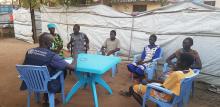How local communities made polio vaccination possible despite the fear of COVID-19
Arok Juong Lueth, a 32-year-old mother of three, a resident of Malueth in Rumbek Centre, Lakes State at the crack of dawn woke up filled with a renewed sense of hope, quickly left her children and house unattended to join a group of women who had offered to help carry Polio vaccines on their heads over a distance of about 30 kilometers to their village to ensure that their children receive polio vaccine.
Heavy torrential rains in 2020 have resulted in severe flooding in many parts of South Sudan including Lakes, Jonglei, Upper Nile, Warrap, Eastern Equatoria, Northern Bahr el Ghazal, and Unity states, forcing tens of thousands of people to flee their homes to higher and dry areas. Floods have also damaged houses, bridges, and airstrips, affecting people’s movement, living conditions, and reducing their access to basic health care services.
Arok and other women delivered the vaccines on their heads to Malueth, Mayen, and Aloor Payam which have been cut off by floods.
“My two siblings were crippled by “GAEL” when I was 12 years old”, said Arok while referring to polio in her native Dinka language. “To take care of the two disabled persons from childhood to date has been the greatest burden to the family”, she added.
“I made up my mind that my children and others must this time receive the polio drops and I have no doubt that the vaccines will protect them” Arok added. And “I thank the government of South Sudan and WHO for bringing the vaccines to Maper and its now our job to ensure that our children are vaccinated”.
“In the past, many of us used to believe that the poliovirus disease was caused by Witcraft” Nyangap Machar Chol, a 34-year-old mother of 3 children said. “Now we know that it is caused by a virus and can be prevented by taking the polio vaccines our children are receiving today”.
Reaching out to South Sudan’s high-risk populations with polio vaccine
Since the declaration of the circulating vaccine-derived poliovirus outbreak, the Ministry of Health with support from WHO and partners has conducted several activities that include a polio campaign to ensure that the unreached receive the polio vaccine to improve herd immunity.
Currently, 21 cases of circulating vaccine-derived poliovirus have been confirmed in South Sudan in eight counties across five states, namely Northern Bahr El Ghazal, Western Bahr El Ghazal, Warrap, Lakes, Central Equatoria, and Eastern Equatoria. The reported cases are children under five years of age and under-immunized who now have irreversible paralysis.
“As Lakes state is facing complex emergencies, we need to strengthen community-based health approach to improve quality essential health care services delivery to the community”, said Mr Stephen Chol, WHO State Coordinator, Lakes State. “Thanks to the partners and the community, we managed to vaccinate over 10 400 children under five with monovalent oral polio vaccine type 2”.
The partnership also contributed to increasing the demand and addressing rejection for the polio vaccine.
“To control the circulating vaccine-derived poliovirus outbreak, the result of under-immunization of communities, WHO is closely working with the Ministry of Health, partners and the community to vaccinate all children under five years of age with polio vaccines and strengthen routine immunization to improve herd immunity against the poliovirus”, said Dr Olushayo Olu, WHO Representative for South Sudan.
The campaign aiming at vaccinating 1.5 million children against the circulating derived poliovirus type 2 was launched on the 10 of November 2020.
State Coordinator, Rumbek, Lakes Hub
Mobile: +211 929216664
Email: garangs [at] who.int
Communications Officer
Mobile: +211 921 647 859
Email: ebrahimj [at] who.int
Communication Associate
Mobile: +211 (0) 921736375
Email: atema [at] who.int

